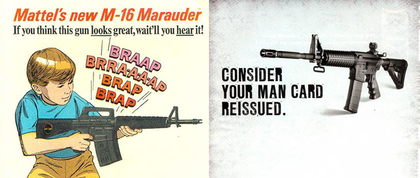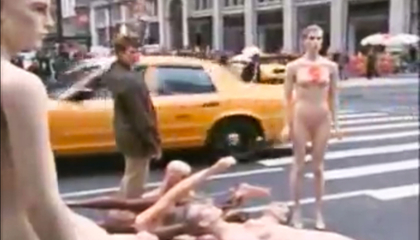
Pictured Above: Mattel ad (left); Bushmaster rifle ad in Maxim (right). Source: Mother Jones.
Dear Colleagues and Students:
Our hearts go out to the families of the victims in the Utrecht and Christchurch massacres this week and last.
As horrific as these mass shootings are, they were followed by glimmers of hope that deserve our attention. In a potential watershed moment last week in Hartford, the Connecticut Supreme Court ruled that the families of those murdered at Sandy Hook Elementary School can sue Remington Arms Company, the gun maker and marketer of the assault rifle used to kill 26 children and educators.
Since 2005, the Protection of Lawful Commerce in Arms Act has shielded gun manufacturers from liability when their products are used to murder people. But in a clever approach to circumventing the PLCAA, these families have taken aim at wrongful advertising instead of wrongful death.
“`The regulation of advertising that threatens the public’s health, safety, and morals has long been considered a core exercise of the states’ police powers,’ Justice Richard Palmer wrote for the majority, adding he didn’t believe Congress envisioned complete immunity for gun-makers.” (CBS)
Over the last year I’ve written articles in the New England Journal of Medicine and The Hill and given numerous presentations on what I believe is a critical lesson from the tobacco wars that can be applied to gun violence. First, repeal the PLCAA, and then work on a Master Settlement Agreement regarding firearms. In fact, there are already supporters of this approach in Congress:
“U.S. Sen. Richard Blumenthal, a Connecticut Democrat, called the ruling a victory for gun violence victims that gives moment to an effort by him and other federal legislators to repeal the 2005 law. ‘It’s a wow moment in American legal history,’ he said. ‘It will change the legal landscape for this industry, potentially all across the country.’ Blumenthal said the ruling reminded him of early court victories against tobacco companies that led them to disclose damaging internal documents and later agree to billions of dollars in legal settlements over sickened smokers.” (CBS)
The best part of the Connecticut ruling is that it’s being allowed to go to trial without an appeal. The tobacco industry masterfully used appeals for decades to delay, distract from, and obfuscate the mounting evidence that their products killed -- and that they knew it. As Senator Blumenthal rightly observed, once-secret documents of gun manufacturers may soon be discoverable and made public, revealing the same incriminating tactics.
One of my first acts as president and CEO of Legacy (now Truth initiative) was to create and endow the Tobacco Industry Documents Library at the University of California, San Francisco. For decades, it has been a treasure trove for public health advocates seeking to safeguard the public through policy and laws. These documents pulled the curtain back on the marketing strategies of the tobacco industry and became the core of the truth® campaign, producing illuminating ads like this one:
Last week in New Zealand, it took just 72 hours after the mass shooting for leaders to agree to overhaul their gun laws. In the U.S. we need to make lifesaving changes with the same sense of urgency -- and we turn our eyes to Connecticut, where we may finally have found the backbone to do it.
![]()
Cheryl Healton, DrPH
Dean
